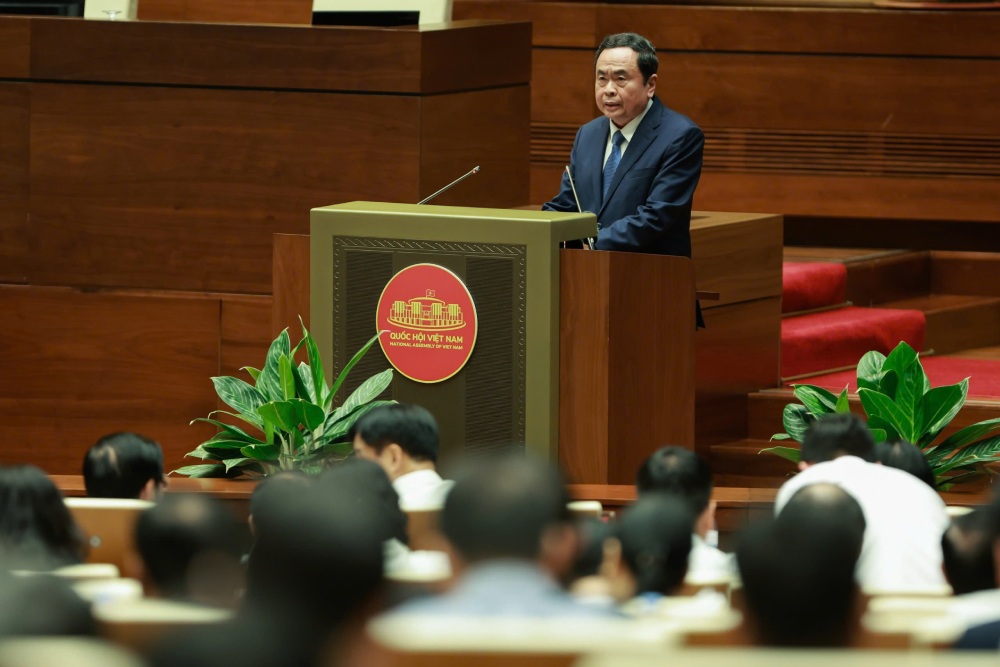On the morning of May 18, a national conference was held in Hanoi to disseminate and implement Resolution No. 66-NQ/TW and Resolution No. 68-NQ/TW of the Politburo.
At the conference, Politburo member and National Assembly Chairman Tran Thanh Man disseminated Resolution No. 66-NQ/TW on innovation in law-making and enforcement.
According to the Chairman of the National Assembly, the Central Steering Committee for institutional improvement and law was established immediately after the Resolution was issued by the Politburo by the Politburo as the General Secretary; The Prime Minister, Chairman of the National Assembly is the Deputy Head.
"This is an event of special significance, marking a turning point in thinking and acting in the work of law-making and enforcement of our country," informed the head of the National Assembly.
The National Assembly Chairman also informed that on May 17, the National Assembly passed a Resolution on a number of special mechanisms and policies that create breakthroughs in the work of law making and enforcement to promptly institutionalize the decisions of Resolution 66.
The Resolution stipulates a number of specific and outstanding mechanisms and policies, which can be said to be unprecedented, not only a payment of 0.5% of the total annual state budget expenditure for law-making work, establishing a policy and law-making support fund.
This Resolution takes effect from July 1, 2025, expected to create a breakthrough, strategic, timely, flexible innovation step, meeting the requirements of law-making and law enforcement.
The National Assembly Chairman stated that Resolution 66 affirms that law making and enforcement is a key task of building a socialist rule-of-law state, which needs to be carried out under the comprehensive and direct leadership of the Party.
An important highlight is the fundamental innovation of the thinking of law-making. The law is identified as a competitive advantage of the country, therefore the Resolution requires a drastic abandonment of the thinking of "if you can't manage it, then ban it" - instead, it must encourage creativity and unlock development resources.
In particular, for laws mainly serving the development of a socialist-oriented market economy, the Resolution requires the maximum reduction of business conditions, reduction of compliance costs; ensuring freedom of business, property ownership and equality among economic sectors.
Consider the private economic sector as the most important driving force of the economy, creating conditions for private enterprises to easily access capital, land, and high-quality human resources.

Resolution 66 requires breakthroughs in law enforcement. The law is enforced fairly, strictly, consistently and promptly, closely linked to the law-making process. The Resolution requires promoting the spirit of serving the people of civil servants, ensuring the viewpoint that "people and businesses are allowed to do what the law does not prohibit".
The National Assembly Chairman also emphasized that the Fatherland Front, organizations and social organizations are actively mobilized to participate in supervising law enforcement and disseminating legal education. The Resolution requires building a culture of law compliance and diversifying policy communication (applying digital technology).
At the same time, resolutely do not "criminalise" economic and civil relations, do not use administrative measures to resolve economic disputes, maintain fairness and flexibility of the law.
Regarding tasks, the National Assembly Chairman emphasized the urgent need to develop a plan and lead the effective implementation of Resolution No. 66. Resolutely do not let the situation of " saying more but not doing less" or " saying but not doing".
Continue to strictly implement discipline, order, regulations on controlling power, preventing and combating corruption, waste, negativity, and "group interests" in law-making and enforcement.











